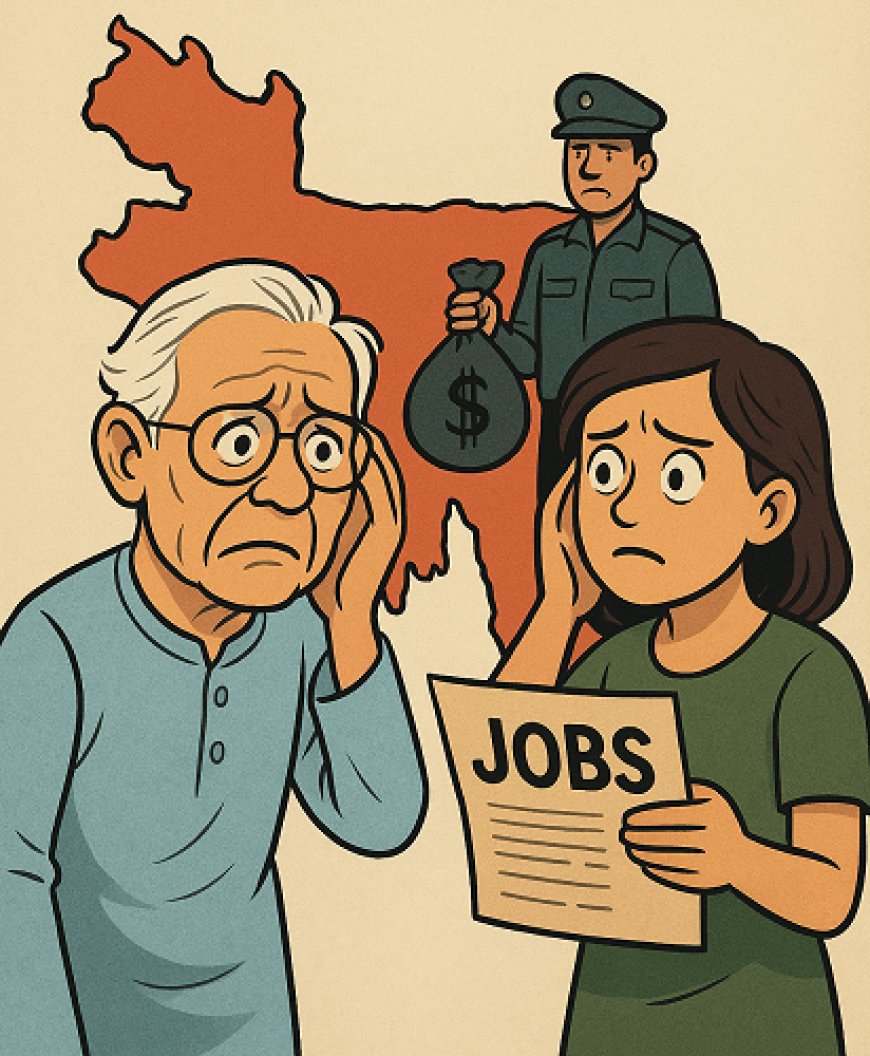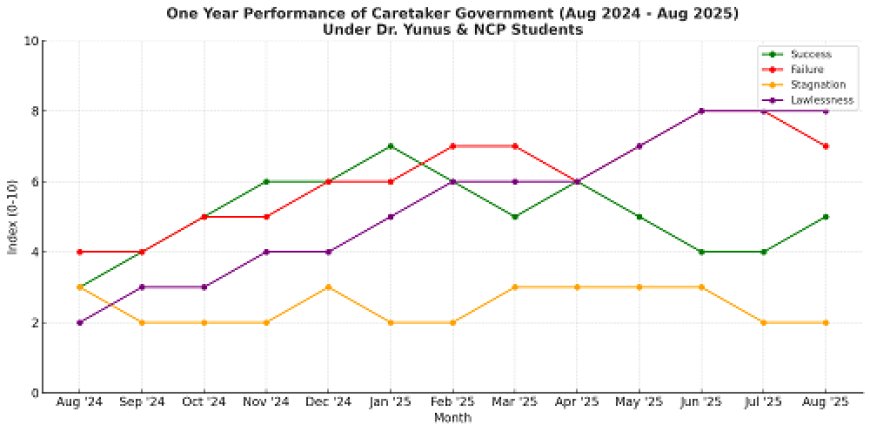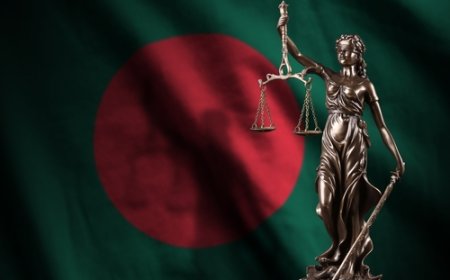Blood, Bureaucracy, and Transition
An evidence-led appraisal of one year of Bangladesh’s interim government

"Revolutions cut both ways: they make and they unmake."
In the bruised wake of July 2024’s student-led uprising, Bangladesh entered a precarious interregnum. The shock was global: former Prime Minister Sheikh Hasina and her cabinet fled en masse, paving the way for an interim administration led by Nobel laureate Dr. Muhammad Yunus -- a curious fusion of reformist aspiration and familiar loyalties.
His cabinet, drawn largely from long-trusted colleagues nurtured within Dr. Yunus’s extended social eco-system, cultivated internal harmony. Most of them had never held high office, yet brought international experience home, converting personal privilege into national service.
Measurable Gains: The caretaker government initiated investigative commissions, prosecuted select figures, and pledged structural reform. It memorialized “July Spring” through the July Book -- a photographic chronicle of struggle and victory -- distributed locally, and globally during Dr. Yunus’s official and personal visits with his motorcade. July Museums were established in state institutions, 36-day cultural festivals now punctuate the calendar as July 36th, according to the Shilpakala academy.
Cabinet members and NCP student leaders held frequent press briefings, reiterating vowing retribution against ousted cronies and promising a “greater Bangladesh.”
Yet on August 5, the 1st anniversary of Bangladesh 2.0, during the Chief Adviser’s July Declaration, the very prominent student leaders spurned the invitation, later discovered to be vacationing in Cox’s Bazar-- fueling public indignation.
Their detachment was underscored by their courteous acceptance of a private meeting with US Chargé d’affaires Tracy Ann Jacobson on August 11, (reflecting Washington’s longstanding advocacy for democracy, free expression, and human rights).
Economic indicators tell a mixed story. The IMF’s projected 6.6% growth for FY 2025 has been pared to 3.8%. Yet the banking sector was stabilized, averting collapse; inflation climbed, but Ramadan price controls on essentials offered respite to the majority-Muslim populace.
Through Yunus’s diplomacy Bangladesh’s standing improved in Saudi Arabia, Malaysia, US, and more -- Malaysia resolving 8,000 stranded workers, agreeing to recruit 18,000 more, Saudi talks advancing a major labour accord, and Bangladesh plans to purchase 25 Boeing aircraft from the USA.
In parallel, government concessions to the Grameen constellation dominated headlines: the chartering of Grameen University, approval for a Grameen mobile wallet, manpower-export licence, and reinstated tax exemption for Grameen Bank.
Under Dr. Yunus, these entities project a doctrine of human-centred development, influencing policy and social enterprise worldwide. Critics decry them as instruments of personal aggrandisement; others view it as strategic nation-branding and soft power.
History offers parallels -- Michigan State University stated : “During Trump’s presidency, companies in his network also enjoyed higher sales and operating income.”
The hope remains that such privilege extends beyond Grameen, channelling catalytic grants to garments, manufacturing, and professionals, so that these sectors, too, may shift into top gear and lift the nation’s trajectory.
Stability’s Paradox: Order and Insecurity
Order has co-existed uneasily with lawlessness. Old rivalries, selective justice, and factional loyalty keep peace brittle. Post-uprising, mob violence, daylight murders, rape, extortion, and mutilations have become grim routine. Even minor disputes are escalating into deadly confrontations, claiming lives.
BBC Bangla cites nearly 100 public killings, 1,000 cases of rape and murder since August 2024.
In a shocking twist, a government advisor was allegedly caught armed with a gun magazine in the airport, though he didn’t face any charges, however in Bangladesh airport security protocols firmly reject any carry-on carriage of firearms or ammunition even by officials or politicians. Same rule apply in the US, if not officially declared fines (up to $15K), arrest, loss of TSA PreCheck privileges, court summons, etc.
A year after championing equality and meritocracy, the movement’s creed erodes. Women -- once vanguards of defiance -- face public harassment, defamation, and online witch-hunts. Even government female advisers, celebrities, and intellectuals are targets of vilification. The cycle is hauntingly familiar: regime consigns women to the same disenfranchisement they fought to dismantle.
Here, the Chief Adviser’s voice is indispensable. With global stature, western mindset and an international family, Dr. Yunus is uniquely placed to enshrine women’s emancipation. An unequivocal call to political actors, law enforcers, and citizens to safeguard women could ignite a cultural turn. Without it, spiralling brutality risks dragging Bangladesh deeper into global disrepute and eclipsing the revolution’s promise, and his legacy.
Victims and martyrs’ families, once the symbolic lifeblood of Bangladesh 2.0, say they are forgotten, their compensation and justice undelivered. During the centenary of first Prime Minister of Bangladesh, Tajuddin Ahmed on July 26, 2025, they stood on that stage in anguish, not pride.
Alarming recent revelations showed that some people officially declared as martyrs of the July Uprising are, in fact, alive -- exposing severe flaws in the government’s record-keeping and verification. Such grave errors not only undermine trust but raise questions about the absence of a meticulous analytical system.
Of all the stagnations in this tenure, none has been more grievous to witness than its inertia in aiding these heroes, begin their justice process, or even compile an accurate list of victims and martyrs. The government must act with precision, urgency, and a robust contingency plan.

Stagnation, Policy Drift, and Public Frustration
Last year mass prisoner releases allowed many to slip free, including convicted rapists and murderers -- deepening instability further. Concomitantly, Efforts to ban polythene or curb traffic noise faltered, reflecting misalignment of priorities.
Without secure communities, women’s safety, eradication of mob vigilantism and credible justice, environmental campaigns risk being tokenistic.
The July 2024 “reverse brain drain” drive to lure skilled expatriates home has stalled; instead, surveys show a surge in talent flight -- exodus of students, professionals, and public figures amid tightening visa restrictions on Bangladesh.
Procedural progress: Commissions, prosecutions, cultural initiatives -- is offset by economic fragility and hesitant investor confidence. Public sentiment oscillates between relief and latent fear. Gratitude to the Chief Adviser and his team remains, but so does disillusionment over unaddressed scandals among student affiliates. Some retain an idealistic aura; others have been implicated in scandals -- financial, extortion or personal gain -- echoing the authoritarian patterns many hoped the caretaker government would purge.
Lack of visible accountability mirrors the old order. Even the ousted alleged fascist regime publicly disavowed certain rogue student leaders -- yet, in the current dispensation, no equivalent measures have followed. This calls for uncompromising transparency in enforcement, for only equitable justice can reclaim the trust we require this revolutionary regime to command.
Reform, Risk, and the Constitutional Question
Election plans with constitutional reform are prudent. The Chief Advisor, having secured consensus among all parties, has declared February 2026 as the election date.
Yet on August 12, an NCP leader abruptly decreed that no election would proceed in February until all reformers were vindicated and judgments rendered against the alleged fascist regime --- threatening to dismantle the DGFI (the principal military intelligence agency tasked with national security and counterintelligence of Bangladesh).
Yet experts warn: an incoming government might nullify these reforms, be it in 6 months or in 6 years, citing the caretaker’s own constitutional legitimacy.
Bangladesh has never seen an entire government flee amid upheaval, creating such a vacuum. The ignominious departure included not just cabinet members but aligned professionals, businesspersons, celebrities, and, among many many others, the governor of the central bank..
Had Dr. Yunus not been appointed, the likelihood of preserving relative stability and international goodwill is doubtful. The path forward lies not in constitutional ambiguity but in expedited, transparent, and citizen-centered reform, eschewing paternalism, Zero-sum beliefs and divisive identity politics.
The Weight of Legacy: Dr. Yunus is conscious that the nation watches, and so does the world. As a head of government and global icon, all triumphs and failures accrue to his name. At 85, with global achievements, this interlude may define his ultimate legacy.
A quick democratic restoration, if achieved, will stand as the culminating chapter of his extraordinary life. Should it fail, this may become a cautionary addendum, whispering of unfinished revolutions.
History’s gaze has never been more intent.
What's Your Reaction?











































































